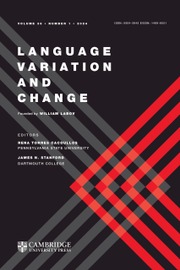Article contents
There's three variants: Agreement variation in existential there constructions
Published online by Cambridge University Press: 25 July 2017
Abstract
Previous studies of agreement variation in existential there constructions treat the variable as binary, distinguishing between agreeing and nonagreeing variants. Using new data from a corpus of English spoken in California, we argue that this widely studied variable cannot be fully understood without instead making a three-way distinction between agreement (there are/were + plural), nonagreement using a full form of the verb (there is/was + plural), and nonagreement using there's. We motivate this three-way distinction by showing that the two nonagreeing variants differ in their distributions with respect to polarity and determiner type, as well as speaker age and education level. Full form nonagreement is more frequent among speakers with less formal education, while there's is favored by younger speakers. These results suggest that the two nonagreeing variants differ in their longitudinal trajectories, a finding that would be obscured in an analysis that makes only a binary distinction between variants.
- Type
- Research Article
- Information
- Copyright
- Copyright © Cambridge University Press 2017
References
REFERENCES
- 5
- Cited by



